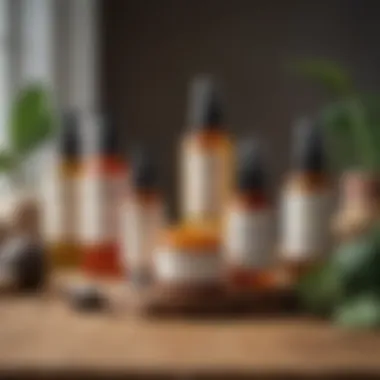The Best Whole Foods Beauty Products: A Comprehensive Guide


Intro
The beauty industry has witnessed a shift towards cleaner, more natural products. Consumers are increasingly aware of what they put on their skin. This guide delves into whole foods beauty products, focusing on their advantages and top choices available today. With a push for clean beauty, many are seeking products with natural ingredients. The aim is to support healthier skin and overall well-being. This guide serves as a resource for anyone interested in elevating their beauty routine with these natural options.
Beauty Tips and Tricks
Beauty routines are often associated with complicated steps and an array of products. However, achieving radiant skin, stunning makeup, and healthy hair can be straightforward with some practical tips. Understanding how to use whole foods beauty products effectively is crucial.
Skincare Routine Tips
A solid skincare regimen is essential. Here are key practices to enhance your routine:
- Cleansing: Use gentle cleansers made from natural ingredients, such as coconut oil or oat extract. Avoid harsh sulfates that can strip the skin.
- Moisturizing: Incorporate natural oils like jojoba or almond oil. These oils hydrate the skin without causing irritations.
- Exfoliating: Look for products containing natural exfoliants like sugar or coffee. They help in removing dead skin cells while being less abrasive.
Haircare Hacks
Maintaining healthy hair is just as important. Try these tips to improve your haircare routine:
- Shampoo Alternative: Use a gentle, sulfate-free shampoo. Alternatively, consider using honey as a natural cleanser.
- Conditioning: Apply avocado or coconut oil as a deep conditioner. These ingredients nourish and strengthen hair.
- Styling: For styling, stick to products that use natural ingredients. Mousse made from aloe vera can give volume without damaging hair.
Makeup Application Techniques
Makeup can highlight your features when applied correctly. Follow these techniques:
- Foundation: Use tinted moisturizers that contain natural oils for light coverage. They hydrate skin while providing a natural finish.
- Eyes: Natural mineral-based eyeshadows not only last long but are also gentler on the sensitive skin around your eyes.
- Lips: Choose lip products enriched with beeswax or shea butter. These ingredients keep lips soft and prevent chapping.
"Utilizing whole foods in beauty products illustrates a conscious choice that reflects personal values toward health and the environment."
Product Reviews
When exploring whole foods beauty products, it's helpful to know which stand out in the market.
Skincare Product Reviews
Investing in high-quality skincare products can yield significant benefits. Brands like Tatcha, known for rice-derived formulas, offer gentle cleansers that suit various skin types. Another popular option is Herbivore Botanicals, praised for its effective serums and oils.
Makeup Product Reviews
In the makeup realm, certain products have gained loyal followings. Brands such as RMS Beauty showcase how natural ingredients can be combined for stunning cosmetics. Ilia Beauty is also recognized for its clean makeup that balances performance and safety.
Haircare Product Reviews
For haircare, consider Acure which focuses on sustainable ingredients that nourish without harmful chemicals. Another favorite is Aveda that combines nature with science, particularly in conditioners and styling products.
Expert Beauty Advice
Input from professionals can enhance understanding of whole foods beauty products.
Professional Makeup Artist Insights
Expert makeup artists often emphasize the importance of skin preparation. A well-prepped canvas allows makeup to apply more smoothly and look more natural. Utilizing natural primers can make a significant difference.
Skincare Specialist Recommendations
Skincare specialists advocate for understanding your skin type. Tailoring your routine and product choice to individual needs is paramount for achieving optimal results.
Hair Stylist Tips


Stylists recommend regular trims to maintain healthy hair. They also stress the importance of using natural oils post-wash to seal in moisture and add shine.
Beauty Industry News
Staying updated with industry trends is beneficial.
Product Launch Updates
Recently, many brands have launched lines focused on whole foods ingredients, catering to the growing demand for clean beauty.
Beauty Event Coverage
Events often showcase the latest innovations in natural beauty. It is important to observe and participate in these gatherings to be aware of emerging trends.
Celebrity Beauty Collaborations
Many celebrities are now launching their brands focusing on environmentally friendly and whole foods ingredients. This shift highlights a broader trend toward sustainability in the beauty sector.
Prelims to Whole Foods Beauty Products
The escalating interest in holistic and sustainable beauty practices has propelled whole foods beauty products to the forefront. Consumers are increasingly aware of what they apply on their skin, leading them to prioritize natural and clean ingredients. This article dives deep into this emerging trend, examining not just the choices available but also the underlying principles driving the movement toward whole foods in beauty routines.
Whole foods beauty encapsulates products derived from organic, non-toxic, and wholesome food sources. Such ingredients often promise better health for skin and hair, while also supporting ethical and sustainable practices. This approach offers another layer to cruelty-free beauty, encouraging mindful consumerism.
Defining Whole Foods Beauty
Whole foods beauty refers to beauty products crafted from natural ingredients sourced from whole foods. Such ingredients might include plant extracts, oils, and minerals that often provide significant nutrients. Unlike conventional beauty products, which may contain synthetic additives, preservatives, and chemicals, whole foods products focus on real, clean, and often organic components. This can lead to not just better health benefits for the user, but can also resonate with eco-conscious values.
Natural oils, like coconut oil or jojoba oil, serve as moisturizers. Ingredients like honey and aloe vera bring soothing benefits. Products that utilize whole foods can often cater to those looking to improve their skin naturally and effectively, providing nourishment that can be easily absorbed by the skin.
The Rise of Clean Beauty
Clean beauty is not merely a trend; it reflects a fundamental shift in consumer awareness and industry standards. In recent years, people have moved away from accepting harmful chemicals in their beauty products. Instead, they seek transparency regarding ingredient sourcing and product formulation. The beauty landscape is evolving as brands rush to adapt to this growing demand. The clean beauty movement promotes not only better skin but also an ethical approach to beauty.
The rise of this movement is evidenced by increased product offerings in stores and online that prioritize clean and healthy formulations. There are now numerous brands centered around whole foods principles, dedicating themselves to transparency and responsibility. This change signifies an important dialogue about what beauty truly means, as more individuals acknowledge that true beauty comes from safe, effective choices.
Benefits of Whole Foods Ingredients
The use of whole foods ingredients in beauty products has become increasingly significant in the formulation of skincare, makeup, and haircare essentials. This section explores several key benefits of these ingredients, emphasizing their role in promoting overall wellness and delivering effective results for users. Whole foods beauty products often contain fewer synthetic chemicals. They offer a resourceful alternative for those seeking to enhance their beauty regimen with nature-derived solutions.
Skin Health and Nourishment
Whole foods ingredients, such as coconut oil, shea butter, and avocado oil, provide profound nourishment for the skin. These ingredients are rich in vitamins and fatty acids that support skin hydration and repair. They help to maintain the skin barrier and improve its texture. For instance, vitamin E, commonly found in products like almond oil, helps protect the skin from oxidative stress, while omega-3 fatty acids can assist in reducing inflammation. Furthermore, natural antioxidants found in whole foods combat free radicals, which are responsible for premature aging. Thus, incorporating whole foods into beauty routines can lead to not just immediate enhancements, but also long-term benefits to skin health.
Reduced Allergens and Irritants
One of the major advantages of using whole foods ingredients in beauty products is the lower likelihood of allergic reactions. Synthetic additives often found in traditional beauty products can trigger skin irritations or allergic responses in sensitive individuals. Whole foods beauty products typically contain simpler, more recognizable ingredients. For example, products that utilize aloe vera gel or honey as base components generally minimize the risk of irritation compared to those with complex chemical compositions. Therefore, consumers with sensitivities should consider opting for products featuring whole foods ingredients, as they generally boast cleaner formulations.
Sustainability and Ethical Sourcing
In an era where sustainability is crucial, the beauty industry is beginning to shift towards more responsible practices. Many whole foods beauty brands prioritize ethical sourcing and environmental consideration. Ingredients like organic jojoba oil or sustainably harvested shea butter not only benefit personal health but also support growing practices that aim to reduce environmental impact. Opting for products made from sustainably sourced whole foods contributes to a more conscientious consumer choice. This kind of selection promotes not only individual beauty but also the welfare of the planet and its ecosystems. By supporting brands that focus on ethical sourcing, consumers align their beauty choices with their values.
"Choosing beauty products with whole foods ingredients is not just a trend; it's a movement towards health, safety, and sustainability."
In summary, understanding the benefits of whole foods ingredients allows consumers to make more informed choices. From nourishing the skin to reducing irritants, and promoting sustainability, the advantages highlight why transitioning towards whole foods beauty products is worthwhile.
Top Whole Foods Skincare Products
In the discussion of whole foods beauty products, skincare stands out as a crucial category. Skincare products with whole foods ingredients offer multiple benefits, such as nourishment and reduced exposure to harmful chemicals. With increasing awareness of what goes into our beauty regimes, many consumers seek products that are both effective and made from natural ingredients. This section will explore various types of skincare products that harness the health benefits of whole foods.


Moisturizers with Nutrient-Rich Ingredients
Moisturizers are essential in any skincare routine. They help maintain skin hydration and support the skin's barrier function. Whole foods-based moisturizers often contain nutrient-rich elements like avocado oil, coconut oil, and aloe vera. These ingredients provide vitamins and fatty acids that are beneficial for skin health. Products containing avocado oil, for example, are high in oleic acid, promoting skin elasticity and hydration. Those who prioritize clean beauty will also appreciate that these moisturizers tend to be free of parabens and synthetic fragrances.
When choosing a moisturizer, look for labels that emphasize sustainably sourced ingredients. The impact of farming and harvesting practices on the environment is increasingly important to consumers, making ethical sourcing an essential consideration for many.
Cleansers that Maintain Skin Balance
Cleansers play a vital role in removing dirt, oil, and makeup from the skin. Whole foods-inspired cleansers often use gentle and non-stripping ingredients. Formulations may include honey, chamomile, or jojoba oil. Honey is known for its antibacterial properties, making it an excellent option for those with acne-prone skin. Chamomile is soothing and perfect for sensitive skin types.
A notable aspect when selecting a cleanser is its pH balance. A balanced pH helps maintain the skin's natural flora. Overly harsh products, even if natural, can disrupt this balance and lead to irritation. Consumers should look for products that specifically mention maintaining a balanced pH.
Exfoliators and Masks from Natural Sources
Exfoliation is a key step in revealing fresh skin. Whole foods exfoliators may include fruit enzymes like papaya and enzymes from sugar cane. These natural components remove dead skin cells without the harshness often associated with synthetic exfoliators. Masks, on the other hand, might feature clay, oatmeal, or activated charcoal.
Natural masks offer the added benefit of being less likely to irritate, which is a significant consideration for sensitive skin types. Ingredients like oatmeal provide calming effects, while clay can help draw out impurities. Regular use of these products can lead to smoother and clearer skin.
The beauty of whole foods skincare is in its simplicity and effectiveness. Choosing formulations that highlight natural ingredients may provide better outcomes without the risk of unwanted additives.
Best Whole Foods Makeup Options
In the contemporary landscape of beauty, there's a pronounced shift towards whole foods makeup options. This trend is largely driven by consumers seeking products that minimize exposure to harmful chemicals and embrace natural ingredients. With a growing awareness of the importance of what goes on our skin, whole foods makeup aligns with the evolving perspectives on health and beauty. Emphasizing natural methods, this type of makeup not only enhances appearance but also supports skin health in the long term.
Foundations Free from Harmful Additives
Foundations play a crucial role in makeup routines as they form the base for overall looks. Choosing a foundation free from harmful additives is essential. Many conventional foundations contain parabens, synthetic fragrances, and other chemicals that can irritate the skin and contribute to long-term health issues. Whole foods foundations, on the other hand, use organic and safe ingredients, promoting a healthier complexion. Popular whole foods foundations incorporate elements like coconut oil, aloe vera, or shea butter. These ingredients provide the necessary hydration without clogging pores.
"When it comes to foundations, less can be more. Prioritizing natural ingredients will benefit both your skin and your overall appearance."
Key Brands:
- RMS Beauty
- Ilia Beauty
- Bite Beauty
Natural Color Products: Blushes and Eyeshadows
Natural color products such as blushes and eyeshadows are gaining traction for their blend of beauty and skin-wise ingredients. Many traditional options tend to include artificial dyes and fillers, which can potentially lead to skin reactions or exacerbated sensitivities. Whole foods blushes and eyeshadows opt for pigments derived from minerals and plants. Not only do they add color, but they also provide skincare benefits, often enhancing skin texture and radiance.
Benefits of Natural Color Products:
- Generally safer for sensitive skin.
- Encourage a natural, radiant glow.
- Ethically sourced ingredients.
Notable Brands:
- 100% Pure
- Alima Pure
- Vapour Beauty
Lip Products Derived from Whole Foods
Lip products, such as balms, glosses, and lipsticks, should preferably be composted from whole foods ingredients. The skin on the lips is particularly delicate, making it critical to avoid potentially harmful chemicals. Natural lip products often include nourishing oils like jojoba or almond, promoting hydration and protection against environmental factors. Moreover, many of these products use natural flavoring and colorants, steering clear of artificial additives.
Highlighted Benefits:
- Nourishment from natural oils and butters.
- Lesser chances of allergic reactions.
- Chemical-free formulation contributes to overall health.
Recommended Brands:
- Bite Beauty
- ILIA Beauty
- RMS Beauty
The move towards whole foods makeup options is more than a passing trend. It embodies a fundamental change in how beauty products are perceived and used. By focusing on natural ingredients, consumers can support their skin’s health while expressing their unique beauty.


Haircare Products Emphasizing Whole Foods
In recent years, there has been a significant shift towards using whole foods ingredients in beauty and personal care products. The haircare category is no exception. Whole foods beauty products often focus on what is put into formulations, prioritizing natural ingredients that promote overall health rather than damaging the hair and scalp. Consumers are becoming more aware of the ingredients they use, and many prefer options free from harmful synthetics, such as sulfates and parabens. This trend not only benefits individual health but also aligns with a broader movement towards sustainability and ethical consumption.
Shampoos Free from Sulfates and Parabens
Shampoos play a crucial role in haircare routines, as they directly affect scalp health and hair quality. Traditional shampoos often contain sulfates, which are strong cleansing agents that can strip hair of its natural oils. This can lead to dryness, irritation, and even damage over time. On the other hand, whole foods shampoos often use gentle, plant-based surfactants that cleanse effectively without harsh effects. Many of these products contain ingredients like chamomile, aloe vera, or coconut oil, which not only cleanse but also provide nourishment.
When selecting a sulfate-free shampoo, look for labels that emphasize natural origins. Ingredients derived from whole foods tend to be safer for all hair types, especially sensitive scalps. Additionally, avoiding parabens is likely beneficial. Parabens are preservatives that can disrupt hormonal balance, and their absence in these formulations can be a key reason many choose whole foods products.
Conditioners that Nourish and Hydrate
Conditioners are essential in maintaining moisture and shine in hair. Whole foods conditioners often prioritize natural oils and extracts, which offer vital nutrients. For example, conditioners that feature ingredients such as jojoba oil or argan oil effectively nourish the hair while providing deep hydration. These oils are rich in vitamins and fatty acids that help repair damage and enhance hair texture.
Additionally, many whole foods conditioners incorporate botanical extracts, such as hibiscus or rosemary, known for their beneficial properties. Hibiscus promotes hair growth, while rosemary can stimulate circulation to the scalp. When reviewing different options, it's advisable to seek products that contain minimal added chemicals and focus heavily on whole food-derived ingredients for the best results in maintaining healthy, vibrant hair.
Hair Masks and Treatments from Natural Ingredients
Hair masks and treatments represent a vital component of any comprehensive haircare regime. They provide an opportunity for intense care, and incorporating whole foods can make a significant difference in effectiveness. Treatments made with natural ingredients such as honey, avocado, or banana can deeply penetrate the hair shaft, providing moisture and enhancing overall hair health.
Each of these ingredients brings unique benefits: honey is a natural humectant, drawing moisture into the hair; avocado provides essential fatty acids and vitamins; and banana adds softness while taming frizz. It is essential to apply these masks properly, allowing sufficient time for the nutrients to absorb. Regular use of whole foods hair masks can lead to a noticeable improvement in hair vitality, shine, and texture.
Choosing Effective Whole Foods Beauty Products
Selecting whole foods beauty products is critical for anyone who desires natural and safe beauty solutions. The rise of awareness regarding health, wellness, and environmental impact has led consumers to seek out products that not only enhance beauty but also prioritize safety and sustainability. Whole foods beauty products offer advantages like minimal chemical exposure and the reassurance of ethically sourced ingredients. This section discusses several key considerations when choosing the most effective products from this category.
Understanding Ingredient Labels
Ingredient labels serve as a vital tool for consumers aiming to make informed decisions. Understanding these labels can demystify what is inside a product. The first step is to familiarize yourself with common terms related to natural beauty products. Look for ingredients that are recognizable and plant-based. Ingredients such as aloe vera, shea butter, and coconut oil are generally safe and beneficial for skin.
Additionally, pay attention to the order of ingredients listed on the label. Ingredients are listed in descending order by weight. This means that the first few ingredients typically make up the largest portion of the product. If harmful substances such as sulfates or parabens are among the first five ingredients, it may be better to avoid that product. Many brands also provide notes or guidelines about their formulations. Such transparents can be handy in selecting truly effective whole foods beauty products.
Identifying Quality Brands
Finding quality brands is not merely about popularity; it is about commitment to clean beauty standards. Some brands are transparent about their ingredient sourcing and manufacturing processes. It is useful to look for certifications like USDA Organic or cruelty-free labels, which affirm a brand's adherence to certain ethical practices. Reputable brands often provide evidence of their sustainability efforts as well.
Researching consumer reviews can also provide insights into product effectiveness and brand reliability. Online platforms such as Reddit and Facebook often have discussions around new beauty products. Engaging in these communities can help one gather opinions on various brands, guiding better purchasing choices.
Considering Allergies and Skin Sensitivities
Everyone's skin is unique. Thus, it is important to consider individual skin types and any potential allergies before selecting whole foods beauty products. Conducting a patch test can help determine how a new product will react with your skin. Apply a small amount of the product to an inconspicuous area and wait 24 hours to see if any irritation occurs.
In addition, reviewing the list of allergens in a product is also essential. Manufacturers often indicate common allergens. If you are cautious of certain substances such as gluten or nuts, be sure to check these labels closely. For individuals with sensitive skin, opting for fragrance-free and hypoallergenic formulations can minimize the risk of adverse reactions.
By carefully evaluating ingredient labels, brand credibility, and personal skin needs, you can make informed decisions when choosing the best whole foods beauty products. Remember, the focus should be not only on beauty enhancement but also on fostering healthier skin with safe and effective solutions.
"Choosing the right beauty products requires diligence and awareness of what works for you personally. Every skin type is different, and so is every ingredient's effect."
Epilogue: The Future of Whole Foods in Beauty
The topic of whole foods in beauty is increasingly relevant in today’s market. As consumers are becoming more educated about the ingredients in their products, the demand for clean beauty is rising. People are looking for beauty products that are not only effective but also safe and sustainable. Whole foods beauty products represent this intersection of health and efficacy, emphasizing natural ingredients and ethical sourcing.
The Evolving Beauty Landscape
The beauty industry is experiencing a noteworthy transformation. Traditional beauty products often contained harmful chemicals and synthetic ingredients. In contrast, the whole foods approach champions transparency, focusing on ingredients derived from plants and other natural sources. This evolution is not just a trend; it reflects a deeper understanding of the relationship between beauty, health, and the environment.
As brands respond to this shift, they are developing innovative formulations that prioritize clean principles. This means nourishing formulations that enhance skin and hair health without unnecessary irritants. Notably, consumers are becoming more aware of their choices. They want to know where their products come from and how they affect their bodies. By aligning beauty with well-being, whole foods products hold promise for fostering healthier beauty routines.
Informed Choices for a Better Beauty Regimen
Choosing the right beauty products can feel overwhelming given the sheer volume of options. Here, informed choices become essential. Shoppers should focus on ingredient labels to identify and question synthetic additives. When understanding the market, it is crucial to recognize trustworthy brands committed to whole foods principles.
Before purchasing, consider potential allergens or skin sensitivities. Investigating sourcing methods and production ethics can also provide insight into brand reliability. This not only supports a healthier regimen but also contributes to sustainable practices in the beauty industry.
In summary, the landscape of beauty is maturing into one where knowledge, health, and ethics come to the forefront. Whole foods beauty products are well-positioned to play a pivotal role in shaping future beauty standards. In doing so, they promote not just individual wellness, but also a healthier planet.







